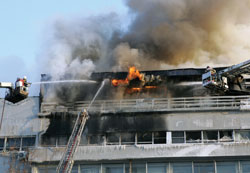Building owners, operators and contractors face a greater threat of prosecution under new health and safety laws, warns Bob Towse. The penalties will be as much as £20,000 or two years’ imprisonment.
Two new pieces of health and safety legislation have ramped up the pressure on all businesses to ensure they carry out their activities safely.
The Health & Safety (Offences) Act comes into force in January 2009. This will increase the fines dished out by Magistrates Courts, when businesses are found to have broken health and safety laws, to £20,000. And it will introduce up to two years in prison for many offences already highlighted by existing regulations.
The Health & Safety Executive (HSE) believes the new act will make it easier to levy serious penalties on organisations that fail to show a duty of care to employees and members of the public.

If fire regulators find no access doors in the ductwork, building owners could face prosecution
'If you put someone at risk, you can be prosecuted,' said HSE principal inspector Trevor Allan at a recent seminar held at the Institute of Directors. 'In fact, you can have a near miss, with no-one hurt or killed, and still end up in court.'
Dramatic impact
The Corporate Manslaughter Act, which has been in force since April 2008, should also have a dramatic impact on building owners' attitude to water and ventilation hygiene, in particular.
The government is now considering a punitive system of fines, starting at a minimum of 5% of a company's total turnover - a staggering amount for major corporations - under this Act if the management's negligence leads to the death of an employee or member of the public.
As well as commercial companies, the act covers a range of organisations including local authorities, NHS bodies, government departments, police forces and business partnerships.
'Under the law, you are required to render a piece of equipment safe,' said Simon Joyston-Bechal, a partner in the firm of solicitors Pinsent Masons.
'This includes having in place a suitable maintenance regime.
'If, for example, fire investigators found there were no access doors in the ductwork, making it impossible to carry out proper ventilation cleaning, then the building owner could be guilty of negligence and face prosecution under the Act.'
Gary Nicholls, a member of the HVCA's Ventilation Hygiene Branch, believes that the new legal framework should clarify the position for building operators.
'Planned, preventative maintenance is the only way to minimise the risk of fires being spread through dirty ductwork, and of legionella bacteria thriving in untreated water,' he said. 'The cost of carrying out essential maintenance is tiny compared with the potential penalties and human misery organisations risk if they ignore their responsibilities.'